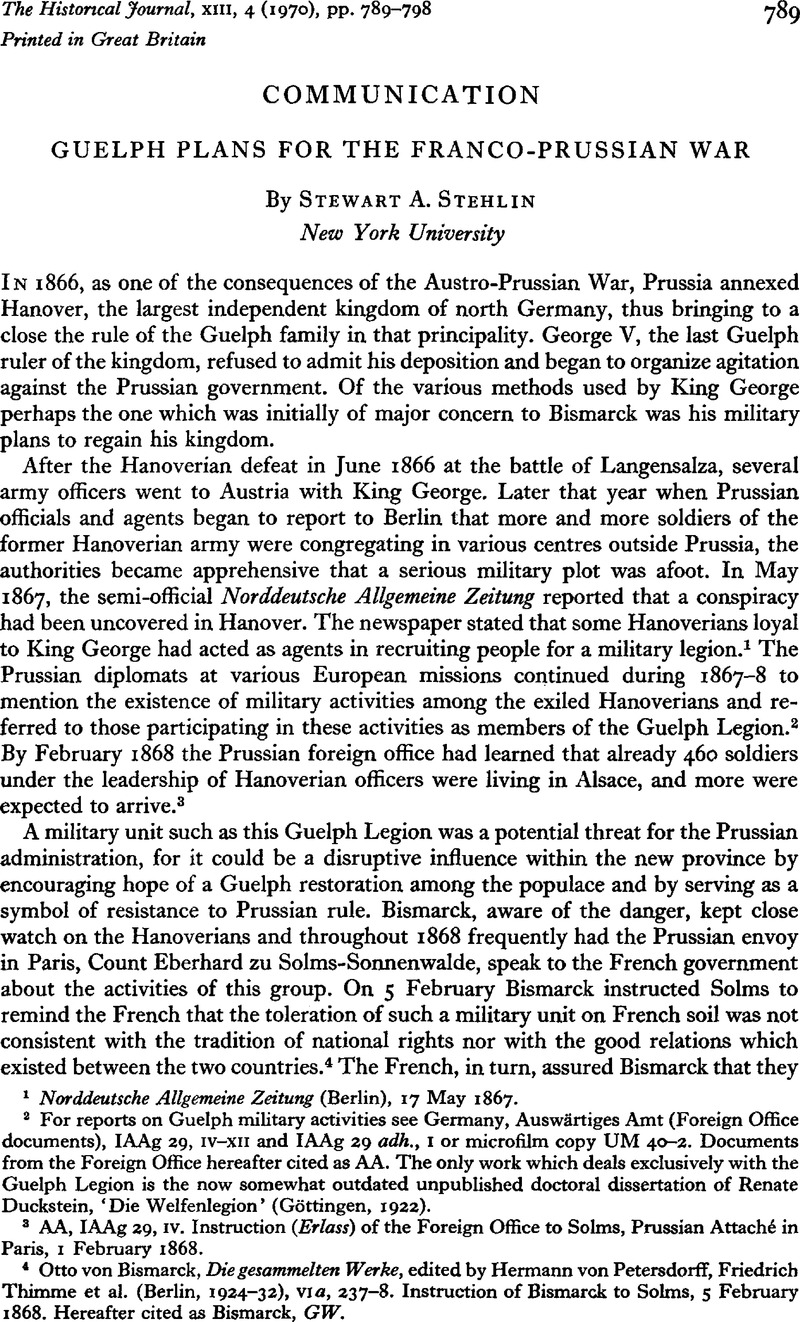Article contents
Guelph Plans for the Franco-Prussian War
Published online by Cambridge University Press: 11 February 2009
Abstract

- Type
- Communication
- Information
- Copyright
- Copyright © Cambridge University Press 1970
References
1 Norddeutsche Allgemeine Zeitung (Berlin), 17 05 1867.Google Scholar
2 For reports on Guelph military activities see Germany, Auswärtiges Amt (Foreign Office documents), IAAg 29, IV–XII and IAAg 29 adh., I or microfilm copy UM 40–2. Documents from the Foreign Office hereafter cited as AA. The only work which deals exclusively with the Guelph Legion is the now somewhat outdated unpublished doctoral dissertation of Renate Duckstein, ‘Die Welfenlegion’ (Göttingen, 1922).
3 AA, IAAg 29, IV. Instruction (Erlass) of the Foreign Office to Solms, Prussian Attache in Paris, 1 February 1868.
4 Otto von Bismarck, Die gesammelten Werke, edited by Hermann von Petersdorff, Friedrich Thimme et al. (Berlin, 1924–32), VIa, 237–8. Instruction of Bismarck to Solms, 5 February 1868. Hereafter cited as Bismarck, GW.
5 AA, microfilm serial and roll number UM 40/120. Report of Solrns to Bismarck, 7 February 1868.
6 For Bismarck's speeches in both houses of the Landtag see Germany, Prussia, Stenographische Berichte über die Verhandlungen des Landtages, Haw der Abgeordneten, 40th session, 29 January 1869, pp. 1,304 ff. and Herrenhaus, 14th session, 13 February 1869, pp. 308 ff.
7 A copy of this letter was found in Austria, Haus-, Hof-, u. Staatsarchiv, Politisches Archiv, in, Preussen, Karton 101. Letter of King George to Emperor Franz Josef, 27 February 1869.
8 Niedersächsisches Staatsarchiv in Wolfenbüttel, Hausarchiv Gmunden, VIII, B47 1. Letter of Meding to George, 4 May 1867. The Hausarchiv Gmunden is the royal family archive of the Guelphs which is temporarily housed in Wolfenbuttel, Germany. Hereafter cited as HG.
9 Brandenburg, Erich et al. (eds.), Die auswärtige Politik Preussens 1858–1871 (Oldenburg, 1934), IX, 399.Google Scholar Report of Friedrich Eichmann, Prussian Minister in Dresden, to the Foreign Office, 16 November 1867.
10 AA, UM 41/119–21. Report of Count Waldersee to the Foreign Office, 12 April 1870. Duckstein, op. cit. p. 77.
11 For further discussion of the war itself see Robert Lord, H., The Origins of the War of 1870 (Cambridge, Mass., 1924)CrossRefGoogle Scholar and Howard, Michael, The Franco-Prussian War (New York, 1961).Google Scholar
12 For example, Pinson, Koppel, Modern Germany, and ed. (New York, 1966),Google Scholar pp. 147 ff. and Passant, E.J., A Short History of Germany, 1815–1945 (Cambridge, 1959), pp. 61–2.Google Scholar
13 For a discussion of some of the local dissension such as in Hanover see Howard, op. cit. pp. 59–60.
14 Theodor Schieder in his book Das deutsche Kaiserreich von 1871 als Nationalstaat (Köln, 1961)Google Scholar treats the opponents to Prussian plans for unification by placing them in three categories, one of which deals with those Germans defeated by Prussia in 1866. See pp. 13 ff.
15 HG, VIII, B31, letters of Count Platen to King George, 18 and 22 July 1870.
16 France, , Les Origines diplomatique! de la guerre de 1870–71 (Paris, 1932), XXIX, 151–2.Google Scholar Letter of Gramont to the Marquis de Cazaux, 21 July 1870. See also XXVIII, 301–2. Letter of Cazaux to Gramont, 13 July 1870.
17 HG, VIII, B31, letter of Breda to Platen, 27 July 1870.
18 For further reports of the negotiations see HG, VIII, B31.
19 HG, VIII, B31, letter of Platen to King George, 28 July 1870. For further treatment of French hopes for Austrian intervention in the conflict see Howard, op. cit. pp. 46–7 and 63–5. For some reports of French plans for reducing Prussian influence in north Germany and reestablishing the kingdom of Hanover see Oncken, Hermann, die Rheinpolitik Kaiser Napoleons III. von 1863 bis 1870… (Stuttgart, 1926), III, 448–51.Google Scholar Report of Baron Gasser, Bavarian minister in Stuttgart, to King Ludwig of Bavaria, 16 July 1870 and report of Count Quadt, Bavarian minister in Paris, to Count Bray, Bavarian Minister President, 17 July 1870.
20 HG, VIII, B31, letter of Breda to Platen, 27 July 1870.
21 HG, VIII, B31, letter of Platen to King George, 18 July 1870.
22 HG, VIII, B31, 17 July 1870.
23 The Guelph Legion.
24 This reference is to the military alliances which the south German states made with Prussia after the conclusion of the war in 1866.
25 King George was excluded by Prussia from participating in the Peace of Prague, and Hanover was officially annexed by Prussian fiat on 1 October 1866. The Prussian government compensated George for his property and his financial losses in the treaty of 27 September 1867 without demanding a written declaration of abdication from George. The Berlin government believed that George's acceptance of Prussian remuneration would be tantamount to acceptance of the status quo in Hanover. For Bismarck's arguments see Bismarck, GW, VIa, 67. Direct report of Bismarck to William I, 29 September 1867. It was precisely this misunderstanding over the interpretation of the treaty which caused the Prussian Landtag to condemn the activities of George and of the Guelph Legion and in 1869 to sequester the Guelph fortune. This fortune later became known as the legendary Welfenfonds of which Bismarck was to make such good use during his entire tenure as chancellor.
26 Among other things George had some 11,000 rifles stored in Paris. HG, Vermögensverwaltung, 0129, contract for the sale of rifles between Count Breda and the French government, 27 August 1870.
- 2
- Cited by




